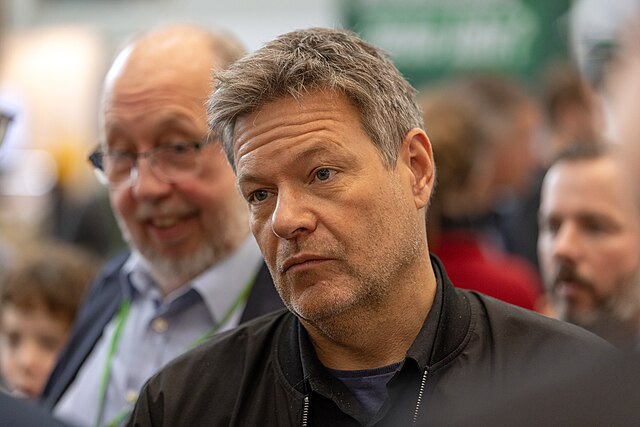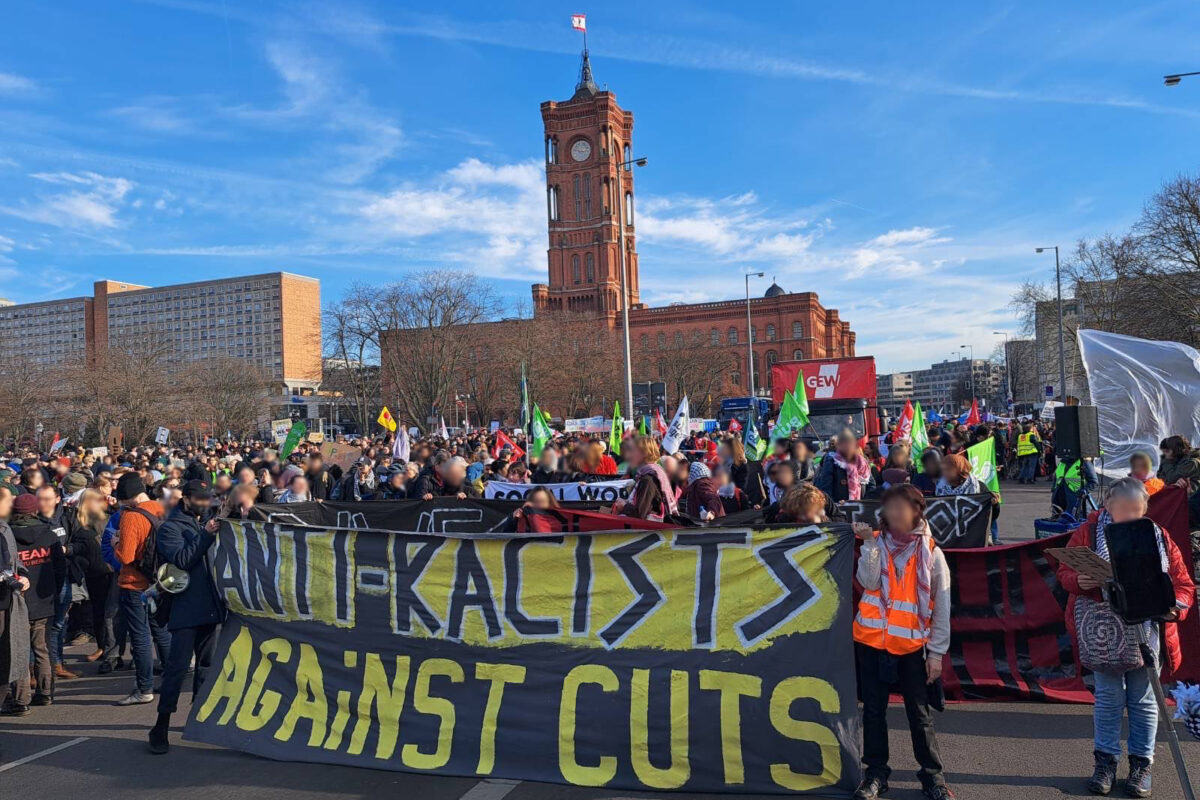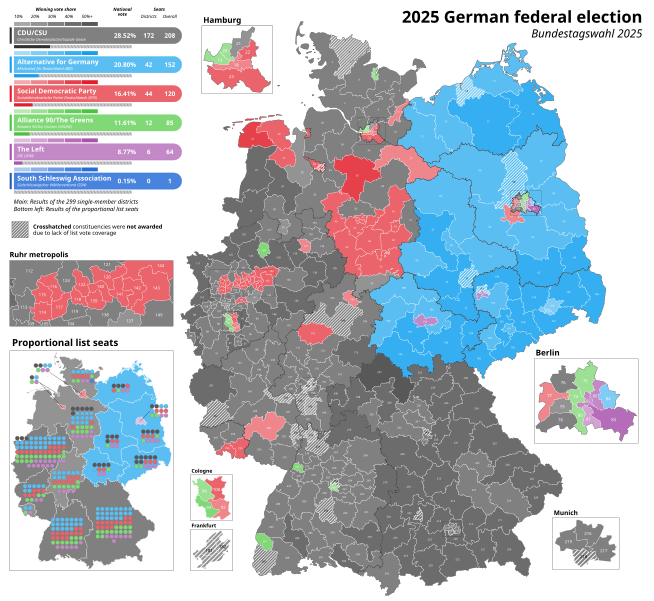The results of the German elections were shocking but not surprising. So unsurprising that I wrote this introductory sentence 2 months ago, when prospects looked even bleaker than they do now. At the time, support for Die Linke was hovering around 3% and it looked like the only vaguely left representation in parliament would be the Bündnis Sahra Wagenknecht (BSW), which had just voted alongside Friedrich Merz and the AfD for stricter migration controls.
I will go into the election results at the end of this article, but first I’d like to offer an analysis of how we got into this mess. How can it be, just over 3 years after we voted in an SPD-led government, that the right wing can be so dominant?
Record of the Scholz government
The election of September 2021 resulted in a “traffic light coalition”, named after the colours of the participating parties — red for the social democrats (SPD), yellow for the (neo)liberal (FDP), and green for Die Grüne. This brought an end to 16 years of Conservative-led governments.
One of the first acts of the new government was to double the military budget, ostensibly as a response to Russia’s invasion of Ukraine. But this money has been increasingly used to provide Israel with weapons, against the will of 82% of the population.
In December 2024, the government passed “the highest sum that has ever been recorded” for Germany’s military budget. Over €20 billion was allocated to the army. SPD defence minister Boris Pistorius announced that he was intending to increase the size of the German army from 180,000 to 230,000.
The increase in military spending took place at a time of rising prices and job losses. This was palpable whenever you visited the supermarket. Partly as a result of the Russian embargo, the price of a bottle of cooking oil rose from around €1 to well over €5. Meanwhile rents were rising and people were finding it difficult to make ends meet.
One main beneficiary from the lack of trust in the 3 government parties was the “official” opposition, the CDU, who saw its support rise from a record low of 20% to 32%. At the same time, the increasingly fascist AfD doubled its support. This set the political tone, and all the major parties felt the need to make strident statements against refugees.
In October 2023, SPD Chancellor Olaf Scholz was on the front page of Der Spiegel magazine saying “We have to deport more people and faster”. A month before, foreign secretary and co-leader of Die Grüne Annalena Baerbock, told the same magazine that she supported increased deportations.
A pre-election report in The Guardian argued: “most politicians have scrambled to ward off the rise of the far right with tough talk on migrants.” In fact, the acceptance by mainstream politicians of the far right’s talking points only helped consolidate the AfD — just as a similar strategy in France a generation earlier had enabled the rise of the fascist Front National (now Rassemblement National).
Economic crisis
Economist Michael Roberts reports: “the economy shrank in 2023 and again in 2024; it seems likely to stay in recession again this year. It adds up to the longest period of economic stagnation since the fall of Hitler in 1945.” Roberts attributes this slump in part to rising energy prices, due to the boycott of Russia, adding “the biggest drop came in the pandemic and profitability is now at an historic low.”
The IW Distribution Report also remarked: “While more than half of respondents in a survey in summer 2020 stated that they were getting along very well or well with their household income, only just under 38 percent of respondents in comparable surveys in 2023 and 2024 said the same.” This perception of poverty, argued the report, was highest among voters of the AfD and BSW.
In January 2025, 2.99 million people were registered unemployed, the highest figure since 2010. Between January 2021 and January 2025, prices rose by 20%. At the end of 2024, Volkswagen threatened to close 3 factories. Instead they sacked 35,000 people and suspended pay raises for 2 years.
Meanwhile in Berlin, the government announced a huge cuts package. This included a 12% cut to the cultural budget, €250 million cuts in education, and massive cuts in housing support. Berlin has a CDU mayor who governs with support of the SPD — maybe a sign of what will happen throughout Germany.
The coalition broke apart over different visions of how to save capitalism. The FDP insisted on maintaining the Schuldenbremse, the debt brake which limits public spending. When Christian Lindner announced a moratorium on social spending, Clemens Fuerst, president of the Institute for Economic Research praised the moratorium, resurrecting an old Nazi slogan “Kanone ohne Butter”, cannons without butter.
This was too much for the FDP’s coalition partners, and the government fell. But neither the SPD nor Die Grüne was prepared to cut the military budget or tax the super-rich. Instead, they assured us that money must be found elsewhere. At best, they were offering cannons and a little margarine.
Crisis of Die Linke
Meanwhile, Die Linke, the main party to the left of the SPD, was suffering an existential crisis. Riven by faction fights, it was unable to take a position on Russia’s invasion of Ukraine and NATO’s response. Within the party, there were three main positions.
The first came from party members associated with the anti-war movement. While criticising the Russian invasion to a greater or lesser extent, they argued that sending German weapons to Ukraine would only escalate the situation. Money for weapons would be better spent on social spending.
A second faction argued that anti-imperialism also includes fighting Russian imperialism and believed (mistakenly in my opinion) that we could ask the German state to benevolently send weapons to Ukraine without imposing its own conditions. They therefore tacitly approved the increase in the war budget.
A third group consisted of the party right wing, which has always seen the main function of the party as taking part in governments. Due to the party’s relatively low level of support, this means making coalitions with the SPD and Die Grüne who explicitly make support for NATO a condition of any coalition.
The result was that Die Linke was unable to offer any leadership. Instead, it did what the party has often done of late. It said very little so as to try to contain a deep ideological dispute within the party. These tensions went much deeper than Ukraine. Die Linke, which was a party born out of social movements, has been absent from most relevant movements in recent years. A couple of months before the election, the party looked dead and buried.
Sahra Wagenknecht intervenes
The dithering of Die Linke created an opportunity for Sahra Wagenknecht, talk show favourite and someone who had been associated with the party’s left wing. In 2023, on the anniversary of the Russian invasion, Wagenknecht and leading feminist (and Islamophobe) Alice Schwarzer called an anti-war demo which attracted 50,000 people.
In January 2024, Wagenknecht and 9 other MPs broke from Die Linke to form the Bündnis Sahra Wagenknecht (BSW). In the European elections a few months later, the BSW won 6.2% of the votes and 6 MEPs (Die Linke gained only 2.7%) Many voted BSW because it was the only party, with the exception of the AfD, with a clear anti-war position.
But the BSW has a darker side, which had already been shown in Wagenknecht’s book Die Selbstgerechten (the self-righteous) where she attacked “an increasingly small and peculiar minority” fighting for the rights of victims of racism, homophobia, and transphobia. She dismissed this fight as meaningless identity politics.
Following a knife attack in Solingen, Wagenknecht attacked “ten years of uncontrolled migration”, and suggested a 6-point plan focussed on more deportations. In her election campaign, she has insisted on calling herself a “left-wing conservative”, distancing herself from socialist ideas.
This found its low point in January 2025, when the BSW voted alongside the CDU and the AfD for laws restricting migration. Much ink was spilled about CDU Chancellor Friedrich Merz breaking the Brandmauer (firewall), an agreement by mainstream parties not to cooperate with the AfD. But the BSW was just as guilty as the CDU, maybe more so.
AfD and Remigration
All this was happening while the AfD was consolidating itself as a fascist party. At the end of 2023, leading AfD members met with Nazis in Potsdam to discuss Remigration — the forced deportation of up to 15 million people. This would only be possible with extreme physical force, but remigration became a central part of the AfD’s electoral campaign.
Following an attack at Magdeburg Christmas market (by an AfD supporter), AfD leader Alice Weidel explicitly called for remigration, to enthusiastic chants from her supporters. Weidel has traditionally not been associated with the openly fascist wing of the party, but is coming increasingly close to them.
This January, a flyer was distributed at the AfD party conference, addressed to “passenger: illegal immigrant”: “The passenger is to board at ‘Gate AfD’ on 23 February, the day of the election, from ‘8 am to 6 pm’”. Two sentences at the bottom of the ‘ticket’ read: “Only remigration can save Germany”.
There were two responses to the AfD’s growing influence. Parliamentarians from nearly all parties doubled down on attacking migrants. But there was also a response on the streets. After the remigration conference was reported, hundreds of thousands of people took to the streets. In January this year, 15,000 took part in a blockade of the AfD party conference in Riesa. On the weekend of the elections, 100,000 demonstrated throughout Germany against the AfD.
The new anti-racist movement on the streets was reflected in the opinion polls in support for Die Linke. The leader of the parliamentary faction Heidi Reichinnek made a speech in the Bundestag in which she said “we are the Brandmauer”, and “we will take to the streets and to the ballot box”. Reichinnek concluded her speech by calling on people to take to the barricades. The speech got 6 million views on TikTok.
Support for Die Linke trebled, reaching 9% in one poll. Party membership rose to a record level with 18,000 new members won during the election campaign. A post-election report said that the party now has 95,112 members. The increased support does not resolve the party’s internal contradictions, but it does reflect that the polarisation in society is going to the Left as well as to the Right.
As support for Die Linke rose, the BSW slumped, maybe as retribution for voting with the AfD. Nonetheless, a number of people with migrant backgrounds who I spoke with before the election still said they would vote BSW as their position on Palestine seemed less terrible than most of the other parties.
The election results and what they mean
Die Linke finished with nearly 9%, winning more votes in Berlin than any other party (with 19.9%). In the working class district of Berlin-Neukölln, anti-racist activist Ferat Koçak won a direct mandate — the first direct mandate that Die Linke has ever won in West Germany. During the election, Ferat issued a leaflet in support of Palestine, and is a beacon of light in a troubled party. It remains to be seen how much he will be able to maintain his independence of thought and deed.
We can celebrate the demise of the neoliberal FDP — kicked out of parliament because they insisted on maintaining the debt brake and making us pay for their crisis. The Bundestag will be a better place without them. FDP leader and former finance minister Christian Lindner has now resigned. Good riddance.
Some leftists were troubled by the BSW’s failure to break into parliament. They have only themselves to blame. Their decision to vote with the AfD for a deportation bill that even the SPD, Die Grüne, and FDP could not support was punished by an electorate which still contains a large number of anti-racists.
The SPD received a record low vote of 16.5%. Although they have not sunk as their French sister party (the Parti Socialiste received 1.75% in 2022), social democracy in Germany is in deep crisis. Die Grüne’s vote went down by 3.6% but they were punished less than their coalition partners. Maybe they were saved by voters who hadn’t engaged with the parties’ track records but wanted to record a vote for the environment. The CDU gained 28.5%, a little lower than predicted, but enough to win comfortably.
The vote for the AfD was troubling. When the first predictions were announced at 6pm — based on what voters told the pollsters, the AfD vote lay under 20%. As the evening wore on, with figures based on how people really voted, this number increased. In the end they received a worrying 20.8% of the vote.
In East Germany, the AfD received over 30% in every state. They also made a dangerous breakthrough in the West, with over 20% in Rheinland-Pfalz and Saarland. Hamburg, which has recently seen several large anti-fascist demos, was the only state in which they received less than 15%.
What happens next?
CDU leader Friedrich Merz is not averse to joining with the AfD, but to do so would be political suicide. The large protests which followed the AfD-CDU cooperation on the deportation bill means that the parties are unlikely to form a government — this time round. A CDU-SPD coalition is possible, but may not survive a full parliamentary term. It could even be rejected by SPD members, desperate to stop the party’s freefall.
A long period of uncertainty is expected, in which the AfD will attempt to further build their fascist base. After the election, AfD’s Weidel said ominously: “Our hand remains outstretched to form a government.” She added that if the CDU chooses to govern with “left-wing parties”, “next time, we’ll come in first”. With over 100 hardcore Nazis already working in the Bundestag, this figure is set to grow.
The CDU has promised an Agenda 2035, whose name is reminiscent of the Agenda 2020 attacks on welfare made by Gerhard Schröder’s SPD government. This means further cuts, more war, and more redistribution of wealth towards the super-rich. The CDU election programme promises “a so-called ‘modernisation’ of working hours”. which promises more work for less pay.
And yet, the new government will face resistance. 2.5 million employees from the public sector union ver.di have already started warning strikes for an 8% pay rise. The large demonstrations against the AfD have also attacked the racist deportation plans of all the major parties. Germany is currently experiencing a lot of despair. But there is also anger and a desire for progressive change.
They can only subdue us if we stop resisting. There is a certain feeling of resignation in post-election Germany, but also a lot of anger. If we are going to fight back, socialist organisation is essential. This means a fight in the trade unions, a fight against war and genocide, and — most urgently — a fight against the AfD Nazis. It’s time to organise.




